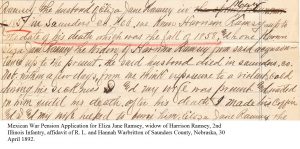Sometimes there simply are no contemporary records of an event.
A researcher can cry, whine, beg on the internet for “help” to the end of time and it simply won’t matter.
Some locations have no civil records during the time period of interest. Some people leave behind no probate record which can be used to suggest an approximate time frame. Some people don’t have a family bible that remains extant to the present day. There are no always letters, diaries, or other personal family ephemera that mentions when something happened.
It doesn’t mean that one doesn’t keep their eyes open for such a record. It just means that one has to be realistic.
Such is the case with Harrison Ramsey who died in Saunders County, Nebraska, in 1858. It’s too early for civil records of death. He left no probate and there are apparently no other documents to provide a date on which he died.
Of course he’s dead. That’s not the problem. Anyone born in the early 19th century is dead by 2018.

But sometimes records do exist.
There is an affidavit in the Mexican War widow’s pension application file for Eliza Jane Ramsey, wife of Harrison Ramsey, that gives documentation for his date of death. R. L. and Hannah Warbritton stated that they were present at Ramsey’s death, cared for him, and assisted in his burial in the fall of 1858 in Saunders County, Nebraska.
Eliza Jane stated in her own “Declaration of Widow for Pension” on 9 May 1887 that Harrison Ramsey died on 3 September 1858 in Saunders County. Was she providing the date from memory, a reference in a family bible, or some other sort of record? That is not known as there is no reference in the declaration to her “source” for the date. From the standpoint of the pension office, the precise date of Harrison’s death in 1858 is not really necessary and not the point. He’s dead and has been dead for some time.
I’ll cite Eliza Jane’s declaration of 1887 as the source for the 3 September 1858 death date for Harrison. I’ll also cite the Warbritton’s affidavit for it as well–tying it to a date of death of 1858 and indicating that they indicated he died in the fall of that year. One could debate whether 3 September is in the fall or not, but that’s not really necessary and, in this case, a waste of time. The precise date of his death is not crucial to any other events other than his death.
Now if Harrison showed up in records after 1858–then we’d have a problem.
But he doesn’t–which is good.
Given when and where Harrison died, I’m lucky that there was a military pension that gave information on his death. That doesn’t always happen.

No responses yet